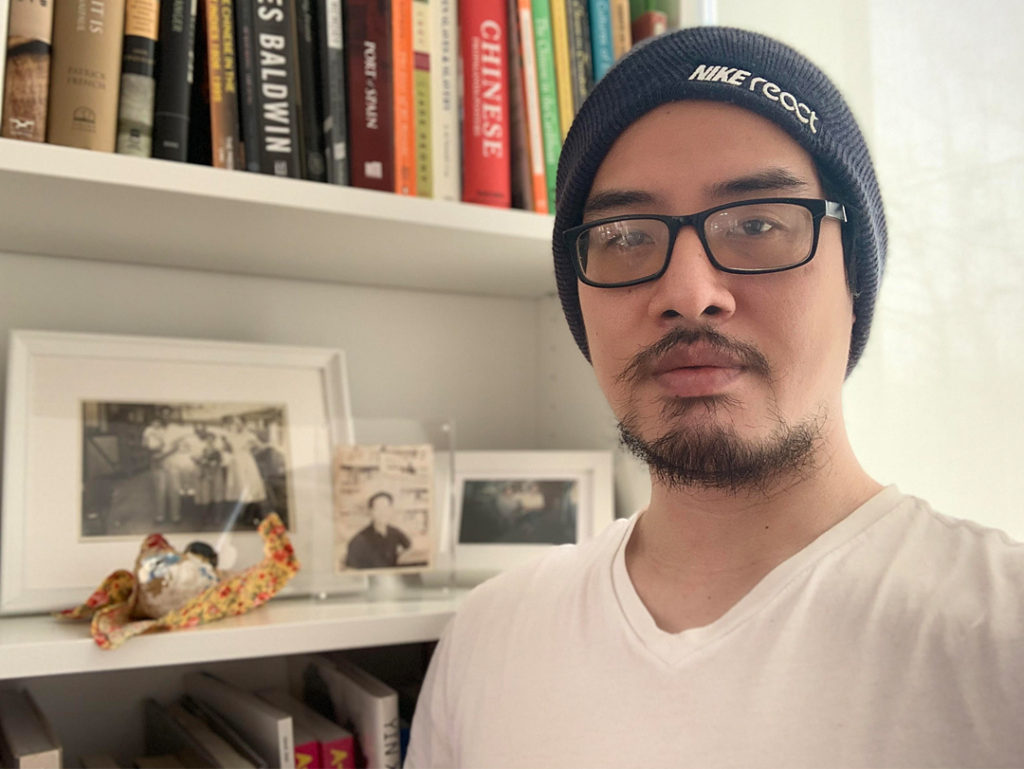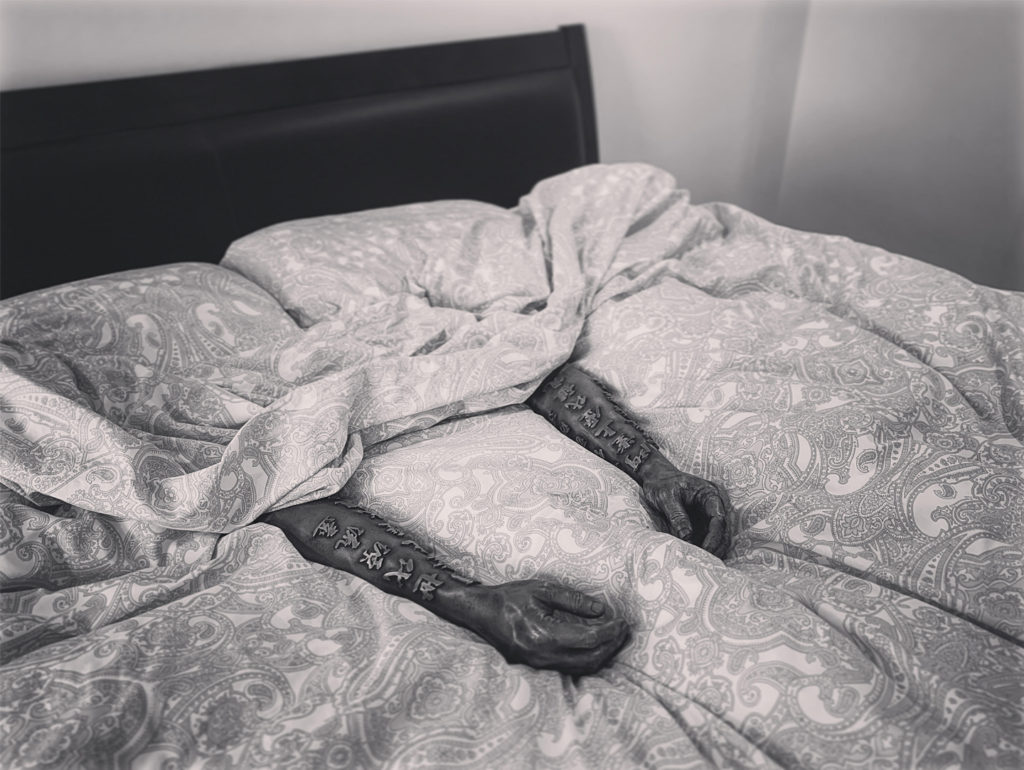A conversation between Marsha Pearce and Joshua Lue Chee Kong

Marsha Pearce: Josh, it’s been a while. Are you in Canada? How are you? How are you dealing with our current circumstances – this global health challenge?
Joshua Lue Chee Kong: Yes, I am currently residing in Toronto, as a student for the last two years. I am doing well, given the unique situation we are facing with Covid-19. For an introvert like myself, I am taking the time to read and I’m learning to cook old family dishes. Honestly speaking, it is a challenge to be away from Trinidad, especially after hearing about the recent death of Tony Hall. It makes me think about all the friends and family I have in Trinidad. Tony Hall will be greatly missed as he is one of the many cultural icons to come from the Caribbean.
Yes, the creative community mourns Tony Hall’s passing. His work in the arts remains as a mighty legacy. How we honour and build on that legacy is important. As we are on the subject of work, I want to talk about what you have been doing in Canada. You’re an MFA student at Ontario College of Art and Design (OCAD) and you were set to open your thesis exhibition to the public in April 2020. Unfortunately, given the pandemic, the show was cancelled. Your thesis work is entitled Melting Pot: Casting a Caribbean Chinese Body. Please tell me about it. What are the materials and components of the work? What would audiences see and hear? What ideas and histories are you engaging?
I am almost finished doing the Interdisciplinary Master’s in Art, Media and Design, which I consider a versatile programme where I can direct my art practice. For the last two years, I pushed myself to try new technical skills like how to DJ to varying degrees of success, printmaking, laser cutting, mould making, bronze casting and 3D printing. Ultimately for my thesis, I fell in love with 3D printing and bronze casting as they offer endless possibilities, and they work so well together.
The last few days before the closure of the University, due to Covid-19, were extremely disruptive – I still experience anxiety looking back. I had to remove all of my work and supplies from my studio, and my thesis exhibition at Sur Gallery had to be cancelled. I am not too worried about the exhibition as it can be shown sometime in the future. My current focus is completing my degree and getting my Canadian permanent residency. However, I must add that not having space to show my work hampers my figuring out how the work will be installed.
In Melting Pot: Casting a Caribbean Chinese Body, I use the conceptual framework of creolization to interrogate the representation of becoming and being Trinidadian-Chinese-Hakka. This is a fluid identity that inhabits and flows within the hyphens between cultures, through the construction of my fantasies, narratives and myths of family dinners, childhood memories behind the shop counter and the voices of my ancestors. As an artist, I explore these ideas of translation and transculturation through my art practice of bronze casting, mould-making, 3D printing. Melting Pot highlights the autobiographical qualities of wax, resin and bronze in expressing the entanglement of the Chinese body in the Caribbean. I do not want to give out too many details about what the audience is expected to hear and see. They will have to wait until I have my exhibition.

You’ve also recently made some installations at home in response to the covid-19 situation – exploring feelings of isolation and the absence of your body. The works are quite intimate as they are constructed in your bedroom. Have you incorporated objects from your thesis exhibition into these installations? Tell me more about these works.
I had to bring all of my work from the studio, which made me reconsider working with lighter materials like textiles – as bronze is not the easiest to carry around. It’s the first time having all of my work at home before they are shown in a gallery. This unexpected turn provided me with a chance to have my work inhabit my house – to provide a more intimate setting for my work that can’t be found in a gallery setting. I guess I can talk more about the bronze cast of my arms as it is specific to this question. Most people will only see the finished bronze arms, but I spent up to three months making them. I made moulds of my arms from which I made wax casts, then cleaned and prepared for the bronze casting process. Working with my arm casts for so long created a special bond as the bronze arms are inscribed with Chinese characters honouring the memory of my ancestors. Having my arms lay on my bed created a surreal moment as we are faced with our own mortality when the body is absent. Also, we have to think about the things we leave behind and wonder if our memories will be treasured or forgotten.
How has graduate study impacted your art practice? What are you taking away from your time at OCAD?
Taking a line from Camille Isaacs, who was on my thesis committee: “Oftentimes those in the diaspora face gaps in their history when homelands of origin are not remembered, or connections are lost.” Doing my master’s degree at OCAD reminded me how much I appreciate being Caribbean Chinese and coming to terms with its complexity and multiple layers of identity. The stories my family share with me and the memories of many home-cooked meals all feed my artistic expression, which also involves having my ancestors take part in my work.
In your art practice you often focus on the past; digging up, interrogating and preserving relics. If you turn your gaze to the future, what are you hoping for?
My practice does include digging up the past, as I try to uncover the stories behind objects. For me, the best stories are of family heirlooms and the memories that are associated with these evocative objects. You just never know what you will find! For the future, I am exploring digital media like photogrammetry and 3D scanning/printing, that I learned from my thesis, to help others preserve and share the stories of their family heirlooms – given how far social media have advanced. My future otherwise is unknown, but I am just taking it day by day and reading a good book along the way.
Stay connected with Joshua Lue Chee Kong:
Instagram: @moko_jumbie_josh
Website: www.joshualuecheekong.com

Comments are closed, but trackbacks and pingbacks are open.